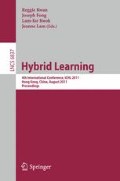Abstract
The efficient transmission of multimedia applications and time sensititive applications in particular, over the heterogeneous networks is a challenging research problem that requires investigation. This paper focuses on an experimental testbed designed to verify the theoretical concept; performance of multimedia content can be improved by optimizing both network and application. User-driven parameter ‘latency’ was used to achieve the objective, during transmission of multimedia files (video, audio, graphics, and text) over a wireless network. Results indicated that latency factor was reduced significantly, when optimization technique was applied on both network and multimedia content as compared to applying on each component individually. This work falls within the scope of “Optimization Technique for Implementation of Blended Learning in Constrained Low Bandwidth Environment” [1].
Access this chapter
Tax calculation will be finalised at checkout
Purchases are for personal use only
Preview
Unable to display preview. Download preview PDF.
References
Suhail, N.A., Lubega, J.: Optimization Technique for Implementation of Blended Learning in Constrained Low Bandwidth Environment. In: Tatnall, A., Kereteletswe, O.C., Visscher, A. (eds.) ITEM 2010. IFIP Advances in Information and Communication Technology, vol. 348, pp. 166–173. Springer, Heidelberg (2011)
Hatakka, M.: Build it and They Will Come? - Inhibiting Factors for Reuse of Open Content in Developing Countries. The Elect. J. of Info Syst. in Dev. Count. 37(5), 1–16 (2009)
End-user multimedia QoS categories. In: ITU-T Recommendation G.1010 ITU-T, G-Series Recommandations, transmission systems and media, digital systems and networks (2001)
Hanna, D.E.: Higher Education in an Era of Digital Competition: Emerging Organizational Models. JALN 2(1) (1998)
Bersin and associates: 4-factor Blended Learning Framework, What Works in Blended Learning. In: ASTDs Source of E-learning, Learning Circuits (2003), http://www.bersin.20.com/ 510.654.8500
De Vries, J.: E-learning strategy: An e-learning Framework for Success. Blue Streak learning, quality learning solutions (2005), http://www.bottomlineresults.elearningcentre.typepad.com/whatsnew/2005/08/strat.html
Khan, B.H., Ealy, D.: A framework for Web-based authoring systems. In: Khan, B.H. (ed.) Web-based training, pp. 355–364 (2001)
PDSEN: Professional Development Series E-News letter. In: The National Youth Develop-ment Learning Network, A Blended Learning Strategy for the Professional Development of Youth workers (2005), http://www.nassembly.org
A Blended Learning Model. In: Training: A Critical Success Factor in Implementing a Technology Solution, North America Radiant Systems (2003), http://www.radiantsystems.co
Dakar+7 Education for all in Africa, Dakar, UNESCO (2007)
Faridha, M.: Towards Enhancing Learning with Information and Communication Technol- logy in Universities. MCS Dissertation report, Makerere University, Kampala (2005)
Palmieri, F.: Streaming Networks: A Differentiated Service Approach. In: EC-VIP-MC, 4th EURASIP Conference focused on Video Image Processing and multimedia Communications, Zagreb (2003), http://www.atics.info
Heinze, A.: Blended Learning facilitated by Conversational Framework: An action resear-ch on the part time course in the University of Salford, PhD interim report (2005)
Botha, J., van der Westhuizen, D., De Swardt, E.: Towards appropriate methodologies to research interactive learning using a design experiment to assess a learning programme for complex thinking. I. J.of Edu. and Dev. using ICT 1(2), 105–117 (2005)
Omwenga, E., Waema, T., Wagacha, P.: A model for introducing and implementing e-l-earning for delivery of educational content within the African context. A. J. of Sc. and Eng. Series 5(1), 34–46 (2004)
Optimizing Internet bandwidth in developing countries higher education. In: INASP (2003)
Harvey, S.: Building Effective Blended Learning Programs. Issue of Educational Technology 43(6), 51–54 (2003)
Abbasi, A.A., Iqbal, J., Malik, A.N.A.: Novel QoS Optimization Architecture for 4G Netw-orks. World Academy of Science, Engineering and Technology (2010)
Author information
Authors and Affiliations
Editor information
Editors and Affiliations
Rights and permissions
Copyright information
© 2011 Springer-Verlag Berlin Heidelberg
About this paper
Cite this paper
Suhail, N.A., Lubega, J.T., Maiga, G. (2011). Optimization Based Multimedia Performance to Enhance Blended Learning Experience in Constrained Low Bandwidth Environment. In: Kwan, R., Fong, J., Kwok, Lf., Lam, J. (eds) Hybrid Learning. ICHL 2011. Lecture Notes in Computer Science, vol 6837. Springer, Berlin, Heidelberg. https://doi.org/10.1007/978-3-642-22763-9_18
Download citation
DOI: https://doi.org/10.1007/978-3-642-22763-9_18
Publisher Name: Springer, Berlin, Heidelberg
Print ISBN: 978-3-642-22762-2
Online ISBN: 978-3-642-22763-9
eBook Packages: Computer ScienceComputer Science (R0)

